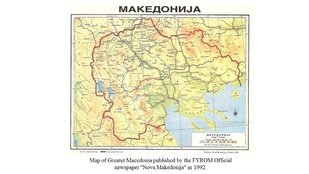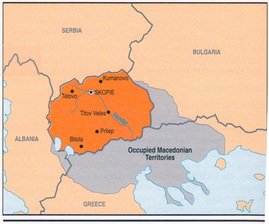 Photo credit: Marcus A. Templar
Photo credit: Marcus A. Templar In published declarations, the so-called Australian Macedonian[sic] Communities of Western Australia (hence AMCWA) falsely claim events, statements, and hidden agendas of the Greek diaspora and the Greek government. As the late U.S. Senator Patrick Moynihan once stated, “Everyone is entitled to his own opinion, but not his own facts.” In such tapestry of disinformation, misinformation, fairy tale, and myth the AMCWA identify the national interests of the Australian government with the national interests of the FYROM. All this is done at the mercy of truths only known to the FYROM citizens and diaspora.
Starting with facts, Greece is a politically unitary country, which for administrative purposes, governments change districts as sees it fit. Borders of districts do not reflect externally recognized boundaries as it happened in the former Yugoslavia. Northern Greece is a geographical term, which includes the regions of Macedonia and Western Thrace. At present, Eastern Macedonia and Western Thrace make up one administrative unit while Central, and Western Macedonia make up the other two.
Starting with facts, Greece is a politically unitary country, which for administrative purposes, governments change districts as sees it fit. Borders of districts do not reflect externally recognized boundaries as it happened in the former Yugoslavia. Northern Greece is a geographical term, which includes the regions of Macedonia and Western Thrace. At present, Eastern Macedonia and Western Thrace make up one administrative unit while Central, and Western Macedonia make up the other two.
 Click to enlarge map
Click to enlarge map The Bulgarian Vasil Kanchov (Kanchev) designed the map that included the area of the FYROM in Macedonia in 1900 under orders from Sofia. Commenting on such a map, H. R. Wilkinson stated, “the validity of Kanchev’s concept of Macedonia as a geographical region depends on upon the criteria used to measure regional affinities” (H. R. Wilkinson 1952, 392). The present map of Greater Macedonia is the approximate equivalent of Kanchev’s map. After 1918, the Kingdom of Serbs, Croats, and Slovenes called the area of the FYROM South Serbia and later Governorate of Vardar.
The Greek region of Macedonia in modern times obtained its official name administratively in 1914 two years after its liberation by Greece, 30 years before the dictator Tito baptized it during the Yugoslav area.
It is interesting that while the FYROM Slavs describe the Greek region of Macedonia as “Northern Greece,” they convert the same region to “Macedonia” when it appears within the map of Greater Macedonia. The FYROM Slavs perceive the acronym “The FYROM” as derogatory because they seem to get self-gratification when they hear or read the word 'Macedonia.'
The fact is that the FYROM and its Slavic diaspora want to monopolize the term Macedonia as if this term exclusively belongs to them. The etymology of the Greek tribe “Macedonians” goes back long before the Trojan War, about 1500 BC. Homer, who wrote in the Aeolic dialect of Chios, offers us “the leaves of a tall poplar tree” (Odyssey 7:106). The Greek presence in Macedonia Proper and the Greekness of the ancient Macedonians are tendered by Strabo 7. Frag. 9, “Macedonia, of course, is a part of Greece"; Eusebius, 227; Paterculus I, 6, 5; Pausanias VI, 22; Herodotus VII.176; Thucydides VII. 57; IV 42.2; III.102; Strabo, VII.6; Herodotus VIII. 137-139; Aeschylus, Suppliant Women 255; Heurtley, BSA 32 (1931), 131-179; Stephanus Byzantius, s.v. Makedon, the Rosetta Stone, and Katadesmos.
Although the adjective “Macedonian” always applied to all inhabitants of Macedonia as a regional name and not an ethnic one, the Third Communist International invented the “Macedonian” ethnicity for strictly political reasons on January 11, 1934 (Misirkov 1974, 158-9; Vlahov 1970, 21, 22, 357; Bechev 2009, XXX-XXXI).
The AMCWA claim that the name of their home country is “Macedonia”[sic] and not the FYROM. The fact according to UNSC the name is “‘the former Yugoslav Republic of Macedonia’ pending settlement of the difference that has arisen over the name of the State,” Similarly, the symbol of the Sun of Vergina has been deemed a Greek symbol by the UNSC (UNSC Res. 817 (1993).
In a mirror image experience, the AMCWA condemn Greek associations for not following the policy of Greece, i.e. compromise on the name issue. Since when any FYROM organization and government have become advocates of compromise? A compromise is the result of mutuality. Nothing thus far has indicated that the FYROM and its diaspora are willing to compromise. The mere fact that they are glued to the “Republic of Macedonia” indicates an unpromising position. Greece has been very accommodating and generous to the FYROM by giving to the FYROM about 90% of what the FYROM sought, including an exit to the Aegean Sea through the port facilities in Thessaloniki.
Given the fact that the FYROM Slavs have full voting rights in the old country by Article 4 of the FYROM Constitution and the Law on Citizenship, the diaspora is an extension of their home country abroad acting as a proxy of the FYROM policy, which stands on a non-compromise strategy of obstructiveness. The AMCWA even ignore the UNSC directive that maintains the FYROM “shall cease to use in any way the symbol in all its forms displayed on its national flag,” i.e. the Sun of Vergina (Interim Agreement, Article 7.2).
However, the AMCWA might not be the peace-loving cultural organization that promotes itself. Through maps of a Greater Macedonia and the branding of the Sun of Vergina on its letterhead, the organization concurrently promotes irredentism and instills ethnic hate to their offspring.
It is interesting that while the FYROM Slavs describe the Greek region of Macedonia as “Northern Greece,” they convert the same region to “Macedonia” when it appears within the map of Greater Macedonia. The FYROM Slavs perceive the acronym “The FYROM” as derogatory because they seem to get self-gratification when they hear or read the word 'Macedonia.'
The fact is that the FYROM and its Slavic diaspora want to monopolize the term Macedonia as if this term exclusively belongs to them. The etymology of the Greek tribe “Macedonians” goes back long before the Trojan War, about 1500 BC. Homer, who wrote in the Aeolic dialect of Chios, offers us “the leaves of a tall poplar tree” (Odyssey 7:106). The Greek presence in Macedonia Proper and the Greekness of the ancient Macedonians are tendered by Strabo 7. Frag. 9, “Macedonia, of course, is a part of Greece"; Eusebius, 227; Paterculus I, 6, 5; Pausanias VI, 22; Herodotus VII.176; Thucydides VII. 57; IV 42.2; III.102; Strabo, VII.6; Herodotus VIII. 137-139; Aeschylus, Suppliant Women 255; Heurtley, BSA 32 (1931), 131-179; Stephanus Byzantius, s.v. Makedon, the Rosetta Stone, and Katadesmos.
Although the adjective “Macedonian” always applied to all inhabitants of Macedonia as a regional name and not an ethnic one, the Third Communist International invented the “Macedonian” ethnicity for strictly political reasons on January 11, 1934 (Misirkov 1974, 158-9; Vlahov 1970, 21, 22, 357; Bechev 2009, XXX-XXXI).
The AMCWA claim that the name of their home country is “Macedonia”[sic] and not the FYROM. The fact according to UNSC the name is “‘the former Yugoslav Republic of Macedonia’ pending settlement of the difference that has arisen over the name of the State,” Similarly, the symbol of the Sun of Vergina has been deemed a Greek symbol by the UNSC (UNSC Res. 817 (1993).
In a mirror image experience, the AMCWA condemn Greek associations for not following the policy of Greece, i.e. compromise on the name issue. Since when any FYROM organization and government have become advocates of compromise? A compromise is the result of mutuality. Nothing thus far has indicated that the FYROM and its diaspora are willing to compromise. The mere fact that they are glued to the “Republic of Macedonia” indicates an unpromising position. Greece has been very accommodating and generous to the FYROM by giving to the FYROM about 90% of what the FYROM sought, including an exit to the Aegean Sea through the port facilities in Thessaloniki.
Given the fact that the FYROM Slavs have full voting rights in the old country by Article 4 of the FYROM Constitution and the Law on Citizenship, the diaspora is an extension of their home country abroad acting as a proxy of the FYROM policy, which stands on a non-compromise strategy of obstructiveness. The AMCWA even ignore the UNSC directive that maintains the FYROM “shall cease to use in any way the symbol in all its forms displayed on its national flag,” i.e. the Sun of Vergina (Interim Agreement, Article 7.2).
However, the AMCWA might not be the peace-loving cultural organization that promotes itself. Through maps of a Greater Macedonia and the branding of the Sun of Vergina on its letterhead, the organization concurrently promotes irredentism and instills ethnic hate to their offspring.
 Click to enlarge map
Click to enlarge map Looking at expansionist maps of Greater Macedonia and Sun of Vergina flags demonstrated in classrooms, parades, and social events, even in churches, one cannot but conclude the incitement of hate and, also, future territorial claims in an official capacity. Regressing to the period before the 1982 Falkland Islands invasion by Argentina, we attest that similar publications had appeared in Argentina before the war because the Argentine had placed the mentality of the Argentinean people and encouraged the regime to attack a British territory. "A generation of schoolchildren had been taught that the Malvinas were Argentine. Postage stamps proclaimed that the Islands were a part of the Argentine Republic. Argentine maps labeled the Islands as "occupied territory" (LCDR Chenette, U.S. Marine Corps Command and Staff College, 1987). No Constitution of any country states that the national goal is to claim neighboring land. It happens over time through Executive or Parliamentary decisions. Article 3 of the FYROM Constitution allows for such a change.
The 1934 Montevideo Convention on the Rights and Duties of States, Article 3, is explicit, “the political existence of a state is independent of recognition by the other states.” It means that the FYROM’s existence is independent of the number of the countries that recognize it, one of which is Greece. Greece recognizes the FYROM’s political existence by the ruling of the UNSC in which Greece and the FYROM had to solve their differences “in the interest of the maintenance of peaceful and good-neighbourly relations in the region (UNSC Res. 817 (1993)).
Since the FYROM provisionally was admitted to the UN, any modification in that name forfeits the terms of its admission to the UN. By the way, a municipality regardless of its size is not a contracting state to “recognize” a country. Only naïve people believe it. Australia is not Bulgaria and the year is not 1885. The only legal entity that has authority over issues of international law is the federal government of Australia. In any respect, the FYROM is not “Macedonia” unless Greece says so.
Two peoples in the Balkans, the Bulgarians, and the FYROM Slavs share language, heroes, heritage, including churches and yet, while the Bulgarians are Slavs, the AMCWA want the world to believe that they are not Slavs, but “ethnic” Macedonians[sic]. Denko Maleski, former Minister of Foreign Affairs of the FYROM (1991-1993) and ambassador to the UN (1993-1997), stated on the matter, “There is nothing atypical here for the process of the creation of any modern nation, except when a falsification was made by substituting the word Bulgarian with the word Macedonian[sic]. However, whenever that was impossible, historical figures were declared to be Bulgarian agents who somehow had entered into a created pure imaginary Macedonian[sic] space.” (Denko Maleski, Utrinski Vesnik, March 03, 2007).
In another point of a nationalistic mirage, the AMCWA claim that “a large minority of ethnic Macedonians[sic] populates Northern Greece.” In the 2009 European elections that took place in Greece with 9,995,992 countrywide registered voters and out of 5,261,036 actual votes cast, the ethnic FYROM Rainbow Party aka Vinozhito tallied 4,530 votes or 0.0008629% of the votes cast. Such numbers are a little bit short of the claimed “large ethnic Macedonian[sic] population,” i.e. Slavic minority inhabiting Greece.
The essential difference between nationalism and patriotism is that in nationalism one wants to take land which belongs to one’s neighbor, whereas in patriotism one wants to keep what is one’s own. The FYROM diaspora promotes maps of a Greater Macedonia, which claim lands from all adjacent countries and especially Greece and demonstrate the Sun of Vergina. As for the contributions of the 60,000 FYROM diaspora of Australia might be great, but it cannot offset the impact that the 550,000 strong Greek diaspora has in the Australian society and politics.
------------------------------------------------------------
About Marcus A. Templar
Marcus A. Templar has served in the U.S. Army as a cryptologic linguist, military intelligence instructor, and all source / SIGINT analyst. His academic research includes the political ideology of Bulgarian intellectuals in Macedonia after the Commune of Paris and the effect of their ideology to the establishment, development, and activities of the Internal Macedonian Revolutionary Organization (IMRO) aka VMRO.
The 1934 Montevideo Convention on the Rights and Duties of States, Article 3, is explicit, “the political existence of a state is independent of recognition by the other states.” It means that the FYROM’s existence is independent of the number of the countries that recognize it, one of which is Greece. Greece recognizes the FYROM’s political existence by the ruling of the UNSC in which Greece and the FYROM had to solve their differences “in the interest of the maintenance of peaceful and good-neighbourly relations in the region (UNSC Res. 817 (1993)).
Since the FYROM provisionally was admitted to the UN, any modification in that name forfeits the terms of its admission to the UN. By the way, a municipality regardless of its size is not a contracting state to “recognize” a country. Only naïve people believe it. Australia is not Bulgaria and the year is not 1885. The only legal entity that has authority over issues of international law is the federal government of Australia. In any respect, the FYROM is not “Macedonia” unless Greece says so.
Two peoples in the Balkans, the Bulgarians, and the FYROM Slavs share language, heroes, heritage, including churches and yet, while the Bulgarians are Slavs, the AMCWA want the world to believe that they are not Slavs, but “ethnic” Macedonians[sic]. Denko Maleski, former Minister of Foreign Affairs of the FYROM (1991-1993) and ambassador to the UN (1993-1997), stated on the matter, “There is nothing atypical here for the process of the creation of any modern nation, except when a falsification was made by substituting the word Bulgarian with the word Macedonian[sic]. However, whenever that was impossible, historical figures were declared to be Bulgarian agents who somehow had entered into a created pure imaginary Macedonian[sic] space.” (Denko Maleski, Utrinski Vesnik, March 03, 2007).
In another point of a nationalistic mirage, the AMCWA claim that “a large minority of ethnic Macedonians[sic] populates Northern Greece.” In the 2009 European elections that took place in Greece with 9,995,992 countrywide registered voters and out of 5,261,036 actual votes cast, the ethnic FYROM Rainbow Party aka Vinozhito tallied 4,530 votes or 0.0008629% of the votes cast. Such numbers are a little bit short of the claimed “large ethnic Macedonian[sic] population,” i.e. Slavic minority inhabiting Greece.
The essential difference between nationalism and patriotism is that in nationalism one wants to take land which belongs to one’s neighbor, whereas in patriotism one wants to keep what is one’s own. The FYROM diaspora promotes maps of a Greater Macedonia, which claim lands from all adjacent countries and especially Greece and demonstrate the Sun of Vergina. As for the contributions of the 60,000 FYROM diaspora of Australia might be great, but it cannot offset the impact that the 550,000 strong Greek diaspora has in the Australian society and politics.
------------------------------------------------------------
About Marcus A. Templar
Marcus A. Templar has served in the U.S. Army as a cryptologic linguist, military intelligence instructor, and all source / SIGINT analyst. His academic research includes the political ideology of Bulgarian intellectuals in Macedonia after the Commune of Paris and the effect of their ideology to the establishment, development, and activities of the Internal Macedonian Revolutionary Organization (IMRO) aka VMRO.




 RSS Feed
RSS Feed